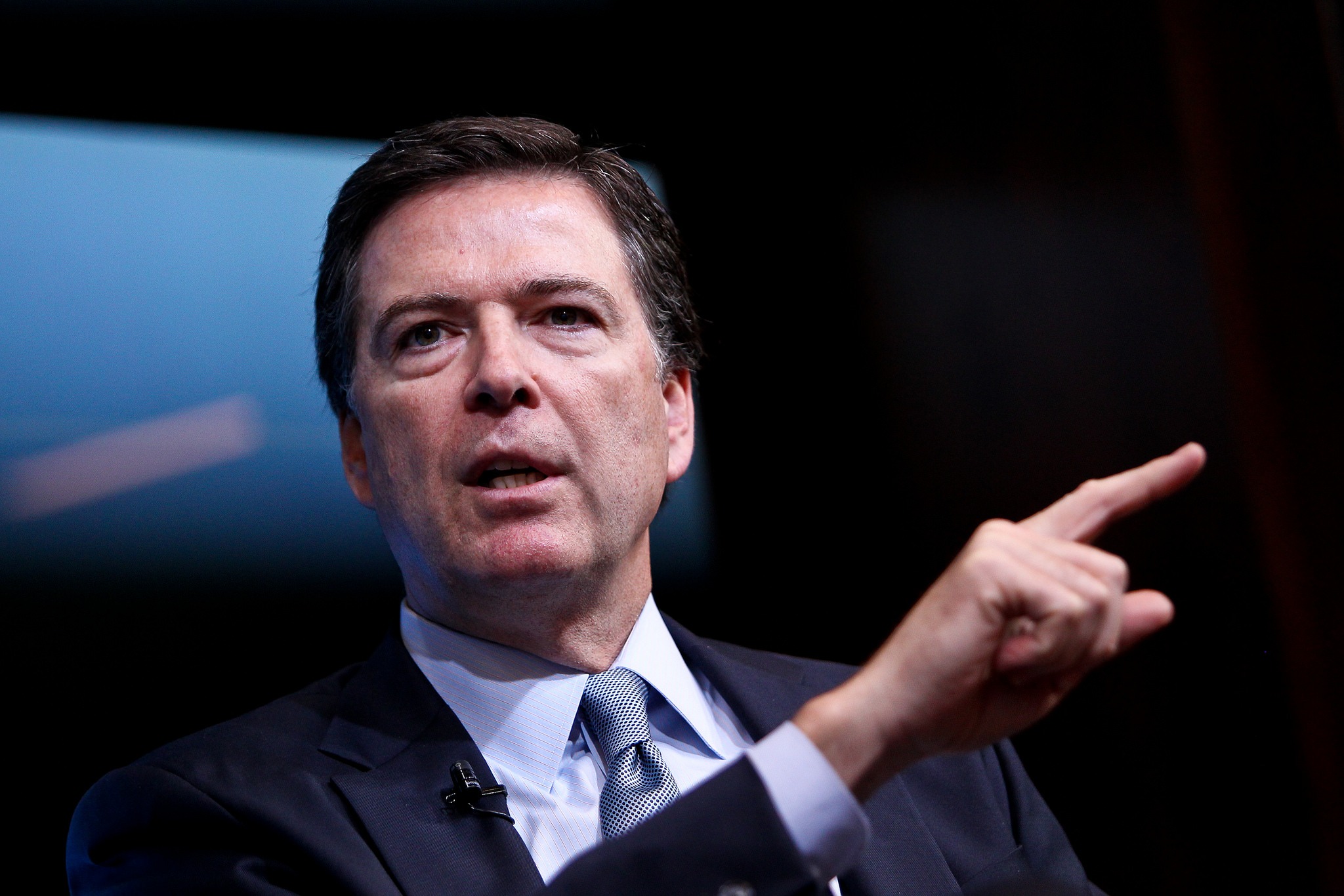The House Permanent Select Intelligence Committee’s Monday hearing on Russian electoral interference was a five-hour Q&A session featuring FBI Director James Comey and NSA Director Admiral Michael Rogers. There will likely be more hearings in months to come, but this one didn’t provide many titillating details. (Or, to put it another way, no, the piss video mentioned in the Steele dossier hasn’t come to light.) But the testimony of Comey and Rogers did bring a number of crucial points to the fore, five of which we’ll reflect on here.
1. The GOP cares more about leaks than Trump’s behavior.
wiretap question
leak question
Russia question
leak question
wiretap question
leak question pic.twitter.com/hh1OCKKcYN— David Wright (@DavidWright_CNN) March 20, 2017
Rep. Devin Nunes (R-Calif.), who perversely has described these investigations as “almost like McCarthyism revisited,” made a point in his opening statement to emphasize the dire need to “determine who has leaked—or facilitated leaks—of classified information so that these individuals can be brought to justice.” Both Rogers and Comey emphasized their obligation to crack down on leaks.
“I’ve never seen such a sustained period of leaks,” noted Peter King (R-N.Y.). The rationale for why this may be the case is lost on him entirely.
But perhaps the most profound back-and-forth on the subject of illegal leaks was between Comey and Rep. Trey Gowdy (R-N.C.) on the release of classified data.
GOWDY: “Is there an exception in the law for current or former U.S. officials who request anonymity?”
COMEY: “… No.”
GOWDY: “Is there an exception in the law for reporters who want to break a story?”
COMEY: “That’s a harder question, as to whether a reporter incurs criminal liability by publishing classified information …”
Although it’s no surprise that the Obama-era war on whistleblowers has carried over into the Trump transition, the insistence to prosecute more whistleblowers, and to rope journalists into these legal battles, is disturbing. The irony of a committee that’s meant to shed light on the Trump campaign’s schemes with Russia shifting the focus to those calling attention to the president’s and his cronies’ schemes shouldn’t be lost on us either. Then again, consistency isn’t the GOP’s strong point.
2. The extent of Russian influence on the 2016 election remains—and likely will remain—unclear.
Although further exploration may set this debate straight, one of the major issues dogging preliminary investigations and reporting on Russian involvement in the 2016 election has been confusion over what constitutes interference. In a January 2017 report, the Director of National Intelligence defines Russia’s actions as an “influence campaign”—one that was ordered directly by Putin. (Admittedly, given the centralized nature of Russia’s security apparatus, this fact should come as no surprise.)
Such a campaign was, at least initially, aimed at undermining “public faith in the U.S. democratic process” and Hillary Clinton’s presidential campaign. Exclusively favoring Trump came later; his election was never the primary goal. Why, then, do at least 50 percent of Democratic voters believe Russia directly tampered with voter tallies when there’s no support for such a claim?
At least for now, all available evidence—not to mention analysis based on the country’s previous electoral interference campaigns in its near abroad and Western Europe—indicates that Russia sought to manipulate public opinion through a “messaging strategy that blends covert intelligence operations … with overt efforts.” A crucial exchange between Nunes and Rogers draws this point out:
NUNES: So my question as of today, Admiral Rogers, do you have any evidence that Russia [sic] cyber actors changed vote tallies in the state of Michigan?
ROGERS: No I do not, but I would highlight we are a foreign intelligence organization, not a domestic intelligence organization. So it would be fair to say, we are probably not the best organization to provide a more complete answer.
NUNES: How about the state of Pennsylvania?
ROGERS: No, sir.
NUNES: The state of Wisconsin?
ROGERS: No, sir.
NUNES: State of Florida?
ROGERS: No, sir.
NUNES: The state of North Carolina?
ROGERS: No, sir.
NUNES: The state of Ohio?
ROGERS: No, sir.
Though this line of questioning may do little to sway the opinion of conspiracy-minded Democratic voters, it is—at the very least—good to get such statements on record.
3. Despite dubious claims about “weakening” the Republican Party platform, there is no evidence that whatever ties Trump has to Russia has actually affected policy.
One point that’s all-too-frequently overlooked in discussions about Trump’s Russia ties is how a Trump presidency would benefit Russian interests on the level of policy. For months, anti-Trump Republican and Democratic lawmakers have zeroed in on the decision to supposedly weaken one aspect of the GOP’s party platform prior to the 2016 Republican National Convention.
According to reporting from The Washington Post, Diana Denman, a platform committee member from Texas, proposed adding recommendations to the party platform to maintain or increase sanctions on Russia, to provide additional aid to Ukraine, and to even go so far as to provide “‘lethal defensive weapons’ to the Ukrainian military.” In response, Trump staffers and pro-Trump delegates stripped the measure of its call for lethal aid in favor of granting “appropriate assistance.”
Some, like Nunes, made a point to strike back against these claims, even though party platforms mean little in day-to-day governing. “They amended the platform to make it stronger than it was,” he said during Monday’s hearings. “The reality … is that the Republicans have a very strong platform against the Russians.”
Whether that “very strong platform” has been embraced by the White House is dubious, but officials haven’t gone out of their way to overturn Obama-era Russia policy. On the contrary, Trump has surrounded himself with Putin critics; even his proposed ambassador to Russia, Jon Huntsman, has taken a hardline stance on U.S.-Russia policy in recent history. While the question of “how much—if anything—did Russia expect from Trump?” remains, recent statements from Russian officials indicate they’re less than thrilled about the new administration’s direction.
4. Russian interference poses a long-term problem.
Even though the substantive benefits of Russian electoral meddling remain somewhat unclear, lawmakers and intelligence officials were quick to note that they expect this sort of activity to become a new norm. “They’ll be back in 2020,” Comey told the committee. “They may be back in 2018.”
Rogers agreed. “I fully expect them to continue this level of activity,” he noted in response to a question from Rep. Ileana Ros-Lehtinen (R-Fla.), “because our sense is that they have come to the conclusion that it generated a positive outcome for them, in the sense that calling into question democratic processes, for example, is one element of the strategy.”
To some extent, the real issue is whether such efforts would be as effective the second time around. Even unsubstantiated reports about Russian meddling unleashed a flurry of anger from both the right and the left. Plus, Russian support for Trump isn’t unconditional. If Kremlin officials are already irked by Trump’s lack of coherent Russia policy—there’s no reason he’d continue to curry favor with them if his campaign rhetoric ends up being left by the wayside.
5. We need to become better at talking about Russia.
The hearing wasn’t without its share of bizarre tangents—all of which could have been easily avoided. In one particular line of questioning, Rep. Jackie Speier (D-Calif.) described Putin’s Russia as a “spider web with a tarantula in the middle.” Speier later went on to opine about the ties between Exxon Mobile and Gazprom, the latter of which she oddly described as an “oil company.” (Gazprom, as its name—which is a portmanteau of “gas industry” in Russian—indicates, is first and foremost a gas company, though it does have a subsidiary, Gazprom Neft, that deals with oil extraction.)
Meanwhile, Speier’s Republican colleagues seemed to think hearings were an appropriate time to subtly sell the idea of lethal aid to Ukraine.
How the United States has allocated resources to handling relations with Russia became a more urgent issue after the invasion of Ukraine in 2014 and recent events ought to serve as yet another wake up call. The rampant speculation and misinformation surrounding Russia’s recent actions doesn’t only make pundits and lawmakers look absurd—it’s also dangerous. Russia is a major power, and our relationship is in the toilet. Classifying Putin as a “tarantula”—which is by no means the worst metaphor used to characterize the Russian president—isn’t going to solve anything.
That said, speculation is only human, and it’s a rational reaction given that the fruits borne of these preliminary investigations have been woefully limited. Unless additional effort is made to conduct Congressional investigations in a free and fair manner, it is safe to say this brand of interference could become a long-term problem.
Hannah Gais is associate digital editor at The Washington Spectator.







The reason that not much was said about the substance of the intelligence on Kremlin influence is that it’s still an open counterintelligence investigation. This does not mean we will never know. It means that Comey and Rogers cannot disclose the information yet.